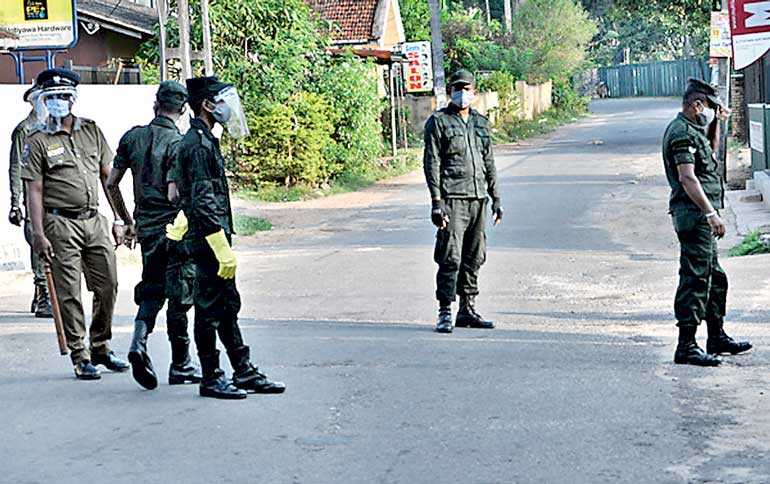Monday Feb 16, 2026
Monday Feb 16, 2026
Tuesday, 9 June 2020 00:00 - - {{hitsCtrl.values.hits}}

COVID-19, the curfew, the restrictions, the fears – has now taken more than three months of our lives. It was not time all wasted, the pause allowed for surfing the net, reading, reflecting; activities, day after day, given only low priority before
– Pic by Shehan Gunasekara
Definitely, one of the more congenial time fillers of the curfew hours was the WhatsApp; browsing its endless stream; inexhaustible, imaginative, flowing steadily. Representing a wide spectrum of views and attitudes; droll, mischievous, partially factual, on occasion even alarming, the medium caters for every age and taste. While we waited anxiously for the menace of the corona to pass, every distraction was welcome. WhatsApp messages kept coming.
“Someone ate an apple and we were born. Now, someone ate a bat and we are dying…
You see, eating is the problem, not drinking”
“Angry wife – ‘I should have married the devil; he would have made a better husband’. Husband – You would have been arrested. In this country marrying a close relative is illegal”
“During the curfew, a local bank sends an email to a borrower – ‘Your payments are outstanding’. Borrower replies ‘thank you for the compliment’.”
“After 3 months of curfew the authorities have formulated flawless guidelines:
Only 3 persons can travel in a car. The fourth attracts COVID-19 (corona)
Motorbike pillion rider is corona-prone
Only 30 persons in a bus. The 31st will bring corona
After 10 p.m. corona is everywhere, until 4 a.m.
Corona is not a threat at supermarkets, but will pounce on you at the ‘Pola’ (outdoor market)
On Sunday, don’t venture out. Corona is on a spreading spree.
If you travel between zones with a pass corona will not interfere. But if you don’t have a pass it will latch on to you…”
Among the more thought-provoking WhatsApp messages received was a series of photographs of 19th/early 20th Century Sri Lankan ‘Walauwas’, mansions of colonial era native elite. Though, nearly all these once grand residences have now become boutique hotels competing for high-end tourists, requiring regular makeovers as well as new additions to the structure, they still carry some of the opulence, impressive in the setting.
Clearly, there was peace and security, defences or walls were unnecessary. The laws protected ownership, investments gave returns. After the money is acquired, a person’s standing must be explained, status defined. The ‘Walauwa’ as a statement of affluence, would have been all the more self-conscious, when contrasted with the pitiable poverty in the rural surrounding; thatched wattle and daub huts; bedraggled villagers eking out a bare existence; skinny bodies, sickly children, emaciated animals.
S.W.R.D. Bandaranayake, who later on was to become the Prime Minister of Sri Lanka (1956), returned from England in 1925, having completed his studies at the University of Oxford. In the 1930s, he penned a series of essays for ‘The Ceylon Causerie’ (published by Messrs. Plate Ltd. of Colombo) of his university days. Bandaranayake when writing these essays, was a member of the Ceylon State Council. The last of the essays in the series was titled ‘I leave the place of many memories’.
“I had nothing to do that last afternoon, and the spirit moved me to go out for a long walk. Down the High, past the Magdalen Bridge, out into the country. Bitter-sweet memories thronged my mind as I took the self-same way that I had once treaded at a crisis that proved to be the real beginning of my Oxford career. All the details of that lonely struggle and the final triumph passed before my mind’s eye. On my return, I lingered on Magdalen Bridge. The typical English scene, subdued and mellow in the evening light, faded from my eyes, and the glare and dust of my own country took its place: blue skies and dancing sunlight, with a white road winding amidst coconut groves and green paddy fields; dark cool nights, with star bejewelled skies, alive with the cries of innumerable crickets; the pathetic, huddled village huts, the dirt, the poverty, the disease. My country, my people.”
The ‘Walauwas’ are generally two, or even three-storied, larger versions of the Dutch era houses seen in the forts; wide verandahs, latticed screens, high ceilings, arched entrances, small well-kept lawns clashing with the untidiness of the tropical foliage; an uncertain expression of wealth, tastes and lifestyle, newly acquired. We can picture in our minds, the unlikely ‘lord of the manor’ in full suit and top hat, walking stick, his womenfolk in long dresses and silk stockings, sitting down to ‘tea’ in the sweltering afternoon, waited on by a large band of obsequious servants.
The floor fully carpeted, reproductions of European paintings or even works of reputed local artist hanging on the walls, silver cutlery, and butter cake. It was not unusual for a ‘Walauwa’ to have a stable (in a country with neither horses nor an equestrian culture), billiard tables, a book laden study; new symbols, new ideas, new comforts; half-understood, poorly-interpreted, were in fashion.
Wealth creation was encouraged by the systems brought in by the colonial rule; those living in the coastal belt, had access to evangelical Christian schools, were introduced to commercial activity, especially as suppliers to the European settlements, were well positioned to exploit the opportunities and did very well; transporting, trading, graphite mining, plantations but mainly arrack renting raked in the rupees.
Kumari Jayawardena in her outstanding research on the making of the nascent capitalist class of the country (Nobodies to Somebodies) describes various aspects of the elite formation that took place under the colonial impact. For example, in relation to coconut plantations, she observes: “The relative ease with which an investor of even moderate means could enter the coconut industry as the owner of a coconut estate was aided by several circumstances. One was the unspecialised nature of its superintendence and the fact that the coconut tree is capable of resisting neglect over long periods. There were also no minutiae of cultivation which called for systematic or undivided effort or complex management procedures – as ensured by managing agencies in the case of tea and rubber.”
For the island’s parvenu capitalists, easy of attitude and weak in application, coconut plantations seem to have fitted to a tee, money for jam.
Not all ‘Walauwas’ housed ‘nobodies’ in the process of becoming ‘somebodies’. Some of the Walauwas carry older names, of a fast disappearing world, their importance dwindling, income negligible. Often, this category of Walauwas are single storied and unassuming; ‘somebodies’ in a downward spiral towards becoming ‘nobodies’.
The person who sent me the photographs of the Walauwas was a ‘romancer’. He described one particular Walauwa with a certain satisfaction, “I have visited this place. Inside the Walauwa there is a big hall where the ‘Disawe’ (Lord) conducted court and punished wrong doers”. I asked what his source was. He said, someone there told him. There were no records of the court.
A Judge, a trial, punishment and justice; complex concepts and processes, simplified in interpretation; an approximation, given as a bare fact. There were trials, and, there were punishments. These were times of wisdom and also empowerment; things were understood, done, and it was good.
Did the realities of the day, allow for the formalities of a court as we are familiar with: wide social literacy, written laws, the judge, the prosecutor, the lawyer and so on – each person with an appointed role in the judicial process, functions, which require a fixed place, a hall, to operate from? In the much spoken of Maduma Bandara travesty, it was summary justice, the king gloating over his cruel and absolute dominance over his helpless hostages.
Nobel Prize winner VS Naipaul in his classic account of the lands of the believers, writes thus about the court system in Pakistan: “The courts were always busy. But, with all their apparatus, they didn’t deliver, the lawyers said. There was too much political interference, too much litigation, there were too many false witnesses; the judges were overworked. But there was no earlier local system that could be restored.
There was a peasant story of justice under the Mogul emperors. Night and day, in this story, a rope hung outside the palace wall. The poor man who wanted justice only had to run to this rope and (if there wasn’t too much of a crush, or if he wasn’t stopped or cut down) pull on it. The rope rang a bell; the emperor appeared at his window, and gave the peasant justice.
This story – really a serf fantasy about the mercy of the master – had got into Pakistani school books as a fact, and was used to make a point about the grandeur of the old Muslim rulers. But according to Waleed Iqbal, a lecturer in law (and a grandson of the poet who proposed the idea of Pakistan) the law here before the British, in the days of the Sikhs, was vague; and going back further, to the times of the Mogul, the law was simply dictatorial.” – Beyond Belief-VS Naipaul.
COVID-19, the curfew, the restrictions, the fears – has now taken more than three months of our lives. It was not time all wasted, the pause allowed for surfing the net, reading, reflecting; activities, day after day, given only low priority before.
Received two more WhatsApp messages today.
“Did you ever think we will have a day when a security guard takes the temperature of a doctor?”
“So, in retrospect, in 2015, not a single person got the answer right to the question ‘where do you see yourself in 5 years from now’.”